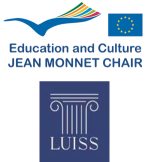The Economic and Social Cohesion Laboratory in London
Twenty five years of history
Twenty five years of history places Esoc-Lab at the forefront of scholarly and applied research on the evolution of European integration and the significance of its policies for a cohesive process of economic and social growth and development in the European Union (EU) and beyond.
Jean Monnet Chair at the London School of Economics. In 1991 Robert Leonardi joined the LSE faculty in the Government Department, having been awarded the first Jean Monnet Chair for European Community Politics and Policies and bringing to LSE the first project on ‘The Impact of the Single Market on the Regions’.
Creation of Esoc-Lab in 1992. He created the Esoc-Lab in 1992 to give a stronger European focus to his funded research conducted at the LSE. He prepared the position paper that was the basis for the founding of the European Institute (EI) in 1994 by LSE Director Ashford. In 1996 Robert Leonardi joined the EI faculty and took the Esoclab to the EI until 2010 when he retired from LSE and incorporated Esoclab. He is currently Professor of European Policies in the School of Government and the Political Science Department at the LUISS University in Rome.
An interdisciplinary and network based approach to research
Interdisciplinary. Since its beginning the Esoc-Lab has been wedded to the principle of an inter-disciplinary approach to research and evaluation. Its projects have analysed EU, national government and international agencies' policies and addressed growth challenges at the different territorial levels. The expertise of academic researchers and professionals from diverse social science fields--including Economics, Political Science, Finance, Regional Science, Development Planning, Sociology and International Relations--has been used to carry out the analyses required by the projects.
Network based. The Esoc-Lab operates on the basis of a research network in carrying out its projects. Over the years a wide and rich network has been built that incorporates prominent academic researchers and professionals from a variety of European, American and Middle Eastern universities, research centres, and agencies who work on the projects it has undertaken.
Expanded content and scope
Esoc-Lab has expanded the content and scope of its interest over time. Four phases are identified and reflected in the nature of the projects and their outputs:
Early-mid 1990s. Esoc-Lab’s early focus was on the reform of the Structural Funds, the new EU Cohesion Policy and national regional policies, and the implementation of the Single Market programme. Among others, Esoclab experimented with a new generation of econometric models that it applied to the analysis of large scale projects undertaken by the EU Cohesion Fund, the 2000 National Highway Programme for Portugal, and major infrastructure projects undertaken by the Emilia-Romagna and Tuscan regions.
Late 1990s. Esoc-Lab added to its work the focus on the Monetay Union and the Agenda 2000 programmes. Also, it added the emphasis on the assessment of the local impact of Cohesion Policy, including the formulation of development programmes at the regional and local levels. It played a vital role in the creation of the European Association of Capital Regions in conjunction with the Madrid Regional Government.
Early 2000s. The Esoc-Lab expanded the geographic coverage and content of its work in light of the new challenges created by the prospects of enlargement to Central and Eastern Europe. Also, it added the emphasis on the reconstruction of the Western Balkans with projects on local development in Slovenia, Albania, Kosovo, Montenegro and Serbia.
Late 2000s and on. The Esoc-Lab acquired a strong focus on the deepening economic crisis in the EU and its implications for the EU's growth and sustainable development strategy. Also, it added the emphasis on the new global challenge and opportunities that are centred on the Southern Mediterranean, Middle East, and Latin America. A current focus is the Europe 2020 strategy and its innovation driven smart growth policies.
Entering its third decade, the Esoc-Lab maintains its commitment to be at the forefront in the analysis of growth and sustainable development challenges, the assessment of current policies, and the formulation of new solutions to the economic and financial challenges.






